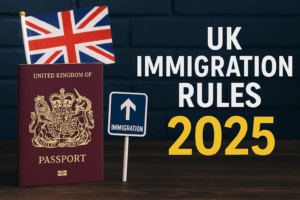The new immigration rules for the UK in 2025, outlined in the government’s latest Immigration White Paper, reflects a recalibration of national priorities, balancing the need for skilled labor with growing domestic pressure to curb net migration.
These bring major changes that affect skilled workers, students, long-term residents, and citizenship applicants.
Whether you’re planning a move or already living in the UK, understanding these updates is essential to ensure compliance and take advantage of the latest pathways to stay, work, or settle permanently.
Below is a breakdown of key questions people are asking in 2025, each addressing a specific aspect of the updated immigration framework:
- What is the UK visa policy reform 2025?
- What are the new updates for international students in the UK?
- What is the 10 year rule for UK immigration?
- What is the good character requirement for UK citizenship?
- How much is the fee for citizenship?
If you are looking to invest as an expat or high-net-worth individual, which is what I specialize in, you can email me (hello@adamfayed.com) or WhatsApp (+44-7393-450-837).
This includes if you are looking for a free expat portfolio review service to optimize your investments and identify growth prospects.
Some facts might change from the time of writing. Nothing written here is financial, legal, tax, or any kind of individual advice or a solicitation to invest.

UK Visa Policy Reform 2025

Since Brexit (United Kingdom’s withdrawal from the European Union), the UK has overhauled its immigration system, replacing freedom of movement with a points-based framework that applies to EU and non-EU nationals alike.
Key Drivers Behind Visa Rules Change
The changes stem from a combination of factors:
- Labor market gaps, especially in healthcare, tech, and construction, prompted the government to refine skilled worker routes.
- Political pressure following rising migration numbers in 2023–2024 has led to tougher eligibility thresholds.
- Public sentiment influenced by inflation and housing shortages pushed policymakers to prioritize economically self-sufficient migrants.
Summary of the Main Changes to UK Visa
The UK visa policy reform in 2025 targeted adjustments across major categories:
- Skilled Worker Visa: Salary thresholds have increased, with exceptions for roles on the Shortage Occupation List. Age considerations are more flexible for senior professionals.
- Family and Dependent Visas: Stricter income requirements now apply to sponsors, affecting family reunification options.
- Study Visas: Post-study work rights remain, but there’s increased scrutiny on dependents. For HNW families, premium school sponsorships are more relevant than ever.
- Settlement and ILR: Greater emphasis is now placed on contribution to the UK economy and the individual’s long-term financial independence.
- Global Talent and Innovator Routes: These remain open and are promoted as pathways for entrepreneurs, investors, and high-performing professionals.
This reform reflects a strategic shift: to attract high-value individuals while tightening lower-skilled or economically dependent routes.
What Is the New UK Study Visa Policy?
In 2025, the UK study visa system continues to evolve, with a particular focus on accommodating international students who can bring benefits to the UK.
This aims to resolve the misuse and exploitation of student visas.
- Student visa eligibility and sponsor requirements: Schools and universities must maintain strict sponsor licenses and comply with enhanced monitoring to ensure international students meet all criteria.
- Post-study work rights and Graduate Route changes: The Graduate Route remains a valuable pathway, allowing international students to stay and work in the UK for up to 18 months after completing eligible courses. However, there is increased scrutiny on work placements, ensuring alignment with degree programs and labor market needs.
What Are the New Rules for Long Residence in the UK?
The UK immigration policy update in 2025 brings clearer guidelines on the 10-year lawful residency rule, a critical pathway for expats and high-net-worth individuals aiming for permanent settlement in the UK.
- Clarifications to the 10-year lawful residency rule: Applicants must demonstrate continuous lawful residence for ten years, with allowances for short, justifiable absences. The updated rules specify which visas and statuses qualify toward this residency period.
- Time gaps, lawful stay, and documentation: Any breaks in lawful status can impact eligibility. The Home Office now requires more detailed documentation proving uninterrupted residence, including visa stamps, tenancy agreements, and financial records. High-net-worth applicants are advised to maintain meticulous records to avoid complications.
These tightened residency requirements emphasize compliance and transparency, ensuring that only those with sustained lawful ties can access indefinite leave to remain and ultimately UK citizenship.
What Is the 10 Year Rule for Immigrants in the UK?
The 10-year rule allows individuals who have legally resided in the UK for a continuous period of ten years to apply for Indefinite Leave to Remain (ILR).
In 2025, this remains a viable route for long-term expats, including high-net-worth individuals who have maintained valid immigration status throughout their stay.
- The rule applies to those on various long-term visas, including work, family, and study categories, provided the residence has been lawful and continuous.
- It’s especially relevant for globally mobile professionals or investors who have spent a decade in the UK under different visa types.
Changes in UK Immigration Requirements or Processing
- The 2025 update emphasizes documented evidence of residency, such as tax filings, utility bills, and visa continuity, with stricter assessments of any gaps or overstays.
- Processing times have improved, but applications are now subject to enhanced scrutiny, particularly around the applicant’s compliance history and good character standing.
What Happens After 5 Years’ Stay in the UK?
Completing five years of lawful residence in the UK may still lead to Indefinite Leave to Remain.
As of 2025, the general qualifying period for ILR has been extended to 10 years for most migrants. However, key exceptions remain:
- Non-UK dependants of British citizens can still qualify for ILR after five years.
- Existing safeguards are retained for vulnerable individuals, including victims of domestic violence and abuse.
- A shorter route may also be available under the government’s proposed “earned settlement” framework. Individuals who make significant Points-Based contributions to the UK economy and society could still qualify for ILR in less than ten years.
What is the good character requirement for British citizenship?
To qualify for Indefinite Leave to Remain or British citizenship in 2025, applicants must meet the UK’s good character requirement.
This means having a clean record regarding criminal activity, immigration breaches, financial conduct, and honesty in applications.
What is proof of good character in the UK?
Proof can include a clean police record, full disclosure of past convictions, evidence of lawful stay, and compliance with new UK immigration rules.
HMRC tax records, credit history, and even past visa conduct may be considered.
Failure to meet this standard such as overstaying a visa, unpaid taxes, or providing false information, can delay or permanently prevent naturalization, even after many years of legal residence.
How Much Does It Cost to Get UK Citizenship?
Gaining British citizenship in 2025 remains a significant financial and administrative commitment, especially for expats and high-net-worth individuals managing complex international affairs.
- Naturalization application fee: As of 2025, the Home Office charges £1,735 for an adult applying for British citizenship.
- Additional mandatory costs:
- Registration: £1,576
- Ceremony Fee: £130
- Optional but common expenses:
- Legal representation or immigration advisor: Can range from £500 to £2,500, depending on complexity
- Document translations or certifications for those submitting foreign-language paperwork
Processing Times and Success Rates
- Processing time: Typically 3 to 12 weeks, though complex cases may take longer, especially where background checks or character issues arise.
- Approval rates: British citizenship applications have a high success rate, especially when applicants meet all criteria clearly and provide comprehensive documentation. However, delays and refusals still occur due to:
- Incomplete or incorrect applications
- Gaps in lawful residence
- Good character requirement issues
High-net-worth individuals are advised to engage a qualified immigration advisor to streamline the process and ensure compliance, especially if residency history includes international travel or prior visa complexities.
Conclusion
The new immigration rules in the UK reflect a deliberate shift toward a more controlled, merit-based system.
These changes aim to restore public confidence by rebalancing migration in favor of national interest, ensuring that the system primarily serves the needs of British residents.
By extending settlement timelines and prioritizing contributions to the economy and society, the UK 2025 immigration reforms are designed to fix long-standing concerns around integration, public service pressure, and perceived unfairness in the previous framework.
While this creates a more selective environment, it also opens doors for expats and high-net-worth individuals who can demonstrate tangible value to the UK.
In such a dynamic legal landscape, proactive planning and tailored immigration advice are more important than ever.
Pained by financial indecision?

Adam is an internationally recognised author on financial matters with over 830million answer views on Quora, a widely sold book on Amazon, and a contributor on Forbes.



